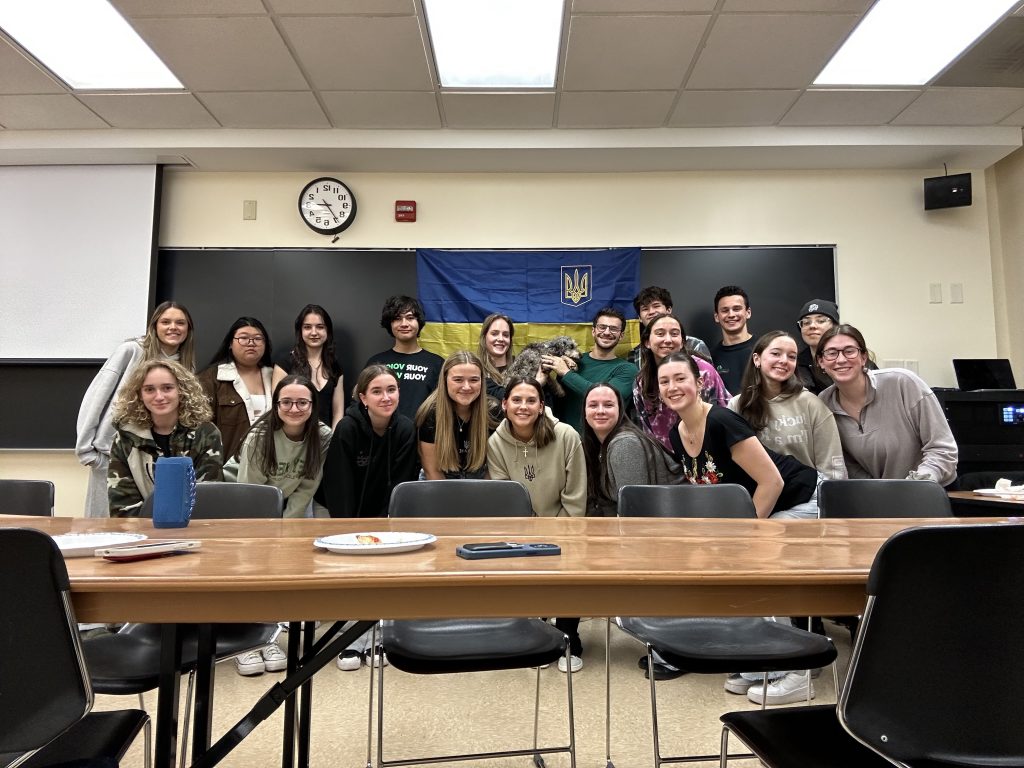The Ukrainian Cultural Association (UCA), a new organization focused on raising cultural awareness and creating a community for Ukrainian students, held its first general interest meeting.
Founded and led by several undergraduate students, the organization held a Nov. 6 meeting creating a space to the Ukrainian community on campus. They discussed planning future events, including celebrating holidays, volunteering with the local Ukrainian community at the Sacred Heart Ukrainian Catholic Church and a vigil for the upcoming two-year anniversary of the War in Ukraine on Feb. 24. The club held their first activity of the semester on Monday night, making bracelets and pins to be sold at an upcoming performance by the Ukrainian music-quartet DakhaBrakha on Nov. 20 at the Anderson Center for Performing Arts.
Julia Biggs, UCA’s president and a sophomore majoring in nursing, explained her motivation for starting the organization and its importance for the campus community.
“When I came to Binghamton [University], I knew there was a big local Ukrainian community, but I didn’t see much community on campus,” Biggs said. “When I found a couple of the other E-Board members we started to form a club, which was really important with the war going on in Ukraine. It’s really important to spread Ukrainian culture and make sure everyone is aware of what’s going on.”
Recently some students, including members of the newly-formed UCA, traveled to Washington D.C. for the third-annual Ukraine Action Summit. The trip was organized by the American Coalition for Ukraine, a group overseeing 75 smaller groups advocating for the Ukrainian cause. Among the groups were Razom for Ukraine, a nonprofit, and the Binghamton-based Together for Ukraine Foundation, which sponsored 14 delegates that traveled to D.C. Delegates had the opportunity to meet with Rep. Marc Molinaro, who represents Greater Binghamton, to discuss the ongoing conflict in Ukraine.
One of the students who met with Molinaro was Vlada Lisova, the secretary of UCA and a sophomore majoring in accounting. She shared the objective of the D.C. trip and her goal of helping Ukrainian refugees apply for college — personally significant for Lisova and fellow E-Board member Albina Martynenko, UCA’s community relations director and a freshman majoring in business administration.
“The purpose of the trip was to speak with Congressmen to bring awareness about the war and some acts we would like them to sign in order to help out Ukraine,” Lisova said. “One of the things we’re planning is to help with refugees who get in contact with Razom. We’d like to help them start college applications because me and [Martynenko] were both immigrants, and when we came here for the first time we found the application process very hard. It’s very different from what we had in Ukraine, so we’d like to help out fellow Ukrainians who might feel lost in that process.”
UCA also intends to hold an event after Thanksgiving break to remember lives lost during Holodomor — “death by hunger” in Ukrainian — a mass starvation inflicted by the Soviet Union from 1932-1933 that led to millions of Ukrainian deaths. The club is also planning to have future fundraising activities to support their future efforts.
Peter Szlivics, a freshman majoring in political science, was among the students gathered for the event held Monday night. From Ukraine himself, Szlivics was enthusiastic about the club’s future and its ability to create a strong sense of community for Ukrainian students at the University.
“As a Ukrainian immigrant who moved here in 2016, it’s very important for people who share love for our country that are here now in [BU] to find a place where you can feel support,” Szlivics said. “The culture is so unique and so specific to you when you grow up, the traditions, how you’re raised by your parents, that being around people of your own just makes you feel that much better on campus. I think this club is a great step forward for the Ukrainian community on campus.”



